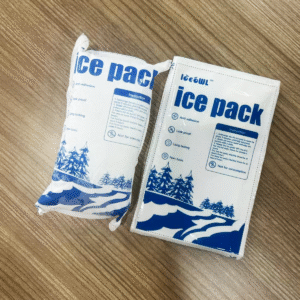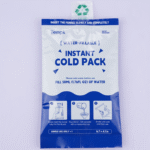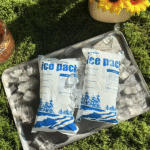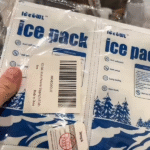Expédition de glace carbonique keeps frozen goods safe without melting, mais seulement lorsque vous l'emballez et l'étiquetez correctement. Dans 2025, la ligne de base tient toujours: dry ice is –78.5 °C and typically sublimates 5–10lb par 24 heures. Si vous prévoyez le bon conteneur, ventilation, et le poids, vous évitez l’accumulation de pression et une détérioration coûteuse. Ce guide montre how to pack dry ice for shipping pas à pas, avec des règles simples que vous pouvez appliquer dès aujourd'hui.
-
How to pack dry ice for shipping with a proven three‑layer method
-
How to size dry ice weight using quick rules and a table
-
Quoi Et 1845 marking and safe venting mean in practice
-
When to combine dry ice vs gel packs en un seul envoi
-
2025 trends that cut cost and risk in expédition de glace carbonique
How do you pack dry ice for shipping, pas à pas?
Utilisez une méthode à trois couches et laissez toujours le gaz s'évacuer. Commencez par les produits surgelés, ajoutez de la glace carbonique au-dessus et autour d'eux, and keep the outer box loosely sealed so CO₂ can escape. This prevents pressure build‑up and keeps temperatures stable for 24–72 hours. Garder expédition de glace carbonique labels visible on one side and note the net dry‑ice weight in kilograms for compliance.
Pourquoi ça marche: L'air froid coule. Placing bricks or pellets on top creates a steady “cold shower.” A loose seal lets gas out, avoiding ruptures. Pour la plupart des colis, plan 5–10lb par jour and add a 24‑hour buffer. If contents are warm at pack‑out, dry ice consumption rises fast. In pharma or seafood lanes, use an insulated inner and sturdy outer to protect both product and handlers.
Which packaging performs best for dry ice shipping?
Use an insulated liner inside a strong outer box. Polystyrène expansé (PSE) or vacuum panels slow sublimation; a corrugated outer adds crush strength. Use cardboard separators so dry ice never touches delicate goods.
| Layered Pack | Quoi utiliser | Pourquoi ça compte | Ce que cela signifie pour vous |
|---|---|---|---|
| Intérieur (produit) | Leak‑resistant poly bag | Contains spills; pas hermétique | Fewer returns and cleaner audits |
| Milieu (isolation) | EPS liner or VIP | Prolonge le temps de maintien | Smaller dry‑ice loads, moindre coût |
| Extérieur (expéditeur) | Double‑wall corrugated | Impact + label area | Survives hubs and handoffs |
Conseils pratiques et gains rapides
-
Frozen first: Pre‑chill to –20 °C or lower to save 20–30% dry ice use.
-
Mind the voids: Fill gaps with kraft paper (breathable) to stabilize loads.
-
Jamais hermétique: Laisser un chemin de ventilation; avoid sealed plastics that trap CO₂.
Résultat réel: A vaccine kit that moved to a vented EPS‑in‑box design held –20 °C for 48 hours with 15% Moins de glace sèche, and arrived without temperature excursions.
How much dry ice do you need for dry ice shipping?
Match dry ice to transit time and payload, puis ajoutez un tampon. En règle générale, planifier ~0.5× charge utile for overnight, 1× for 48 hours, et 1.5× pendant 72 heures. Add more for hot routes or thin insulation. This keeps expédition de glace carbonique resilient to delays.
Des détails qui comptent: Chaleur ambiante, densité d'isolation, and product start‑temp drive consumption. In summer or multi‑stop routes, add an extra day of dry ice. Distribute bricks top/side; consider a small bottom layer in heavy boxes to even the chill.
Suggested dry ice weights (test and adjust)
| Charge utile (kg) | 24 H (kg) | 48 H (kg) | 72 H (kg) | Ce que cela signifie pour vous |
|---|---|---|---|---|
| 5 | 5 | 10 | 15 | Small boxes stay frozen up to 3 jours |
| 10 | 8 | 10 | 15 | Equal weight works for 48 h lanes |
| 20 | 12 | 20 | 30 | Add bottom layer for balance |
| 30 | 15 | 30 | 45 | Use separators to avoid freeze burn |
| 50 | 25 | 50 | 75 | Reinforce outer box; étiqueter clairement |
Calculator you can use (simple rule)
Conseil: Pour fret aérien or customs‑heavy lanes, ensemble heat_factor = 1.3 to cover delays.
What labels and documents does dry ice shipping require?
Marque, secouer, et déclarer. Use the proper shipping name «Dioxyde de carbone, Solide", Et 1845, and the net dry‑ice weight (kg) on the same side of the box. Continuez à emballage ventilé; never hermetically seal inner bags. Follow current IATA/air‑carrier variations and domestic rules (Par exemple, 49 CFR) pour expédition de glace carbonique.
In plain words: Labels warn handlers; venting prevents pressure. Baggage limits are strict, while cargo shipments follow operator rules and packing instructions. Train staff on CO₂ hazard basics and PPE. Include handling notes for recipients so leftover dry ice sublimates in a ventilated area.
Quick compliance checklist
-
Marking present: Et 1845 + «Dioxyde de glace sèche / carbone, Solide" + poids net
-
Emballage ventilé: No airtight seals on any layer
-
Docs ready: Air waybill states dry‑ice weight; shipper/consignee info visible
-
Équipe formée: Gants, pinces, protection des yeux; CO₂ exposure awareness
When should you combine dry ice and gel packs in one box?
Use dual‑zone packing when some items must not freeze. Dry ice keeps frozen goods solid; packs de gel protect items that need 0–4 ° C. Separate zones with cardboard or foam so gel‑protected items don’t over‑freeze during expédition de glace carbonique.
Pourquoi ça aide: Gel packs slow sublimation and create a “soft chill” layer. This is ideal for meal kits, mixed biologics, ou fruits de mer. Test your layout before scaling—added weight changes freight class and handling.
Layout that prevents over‑freezing
| Zone | Réfrigérant | Placement | Signification pour vous |
|---|---|---|---|
| Articles surgelés | Briques de glace carbonique | Haut + côtés | Rock‑solid proteins or reagents |
| Tampon | Foam/cardboard | Between zones | Stops freeze creep |
| Articles réfrigérés | Packs de gel (0–4 ° C) | Around items | Protects greens, flacons, desserts |
La sécurité avant tout: how do you prevent incidents in dry ice shipping?
Protect people and space. Use loose‑fit insulated gloves, protection des yeux, and tongs. Store and open boxes in ventilated areas because CO₂ is heavier than air and can pool. Never place dry ice in sealed glass/metal containers. Dans expédition de glace carbonique, the safest container is insulated yet not airtight.
“Do / Don’t” that reduces risk
-
Faire: Pre‑cool goods; laisser les chemins de ventilation; add a 24 h buffer of dry ice.
-
Faire: Add clear “safe handling” cards for recipients.
-
Ne le faites pas: Tape every seam shut; piège à gaz; let dry ice touch delicate items.
2025 updates and trends in dry ice shipping
Quoi de neuf 2025: Lighter fiber‑based coolers reduce fuel and emissions, while hybrid PCM + glace carbonique packs extend hold time and prevent over‑freezing. Route analytics cut dwell time, so you need less dry ice for the same lane. CO₂ capture pilots at hubs aim to recycle sublimated gas back into pellets, improving sustainability in expédition de glace carbonique.
What’s moving the needle
-
Lightweight shippers: Same performance with less mass to move.
-
Réfrigérants hybrides: PCM sleeves plus dry ice for dual‑zone control.
-
Smarter routing: Fewer handoffs and delays reduce ice consumption.
Vue sur le marché: As frozen e‑commerce and biologics expand, expect tighter CO₂ handling guidance, more reuse programs, and standardized indicators for vented packaging. Brands that test and document their pack‑outs will outrank competitors on reliability and cost.
FAQ
How to pack dry ice for shipping without damaging products?
Keep dry ice on top and sides, Ajouter des séparateurs, et aérez la boîte. This avoids freeze burn and pressure spikes during expédition de glace carbonique.
How much dry ice for a 48‑hour lane?
Commencer par 1× poids de la charge utile de glace sèche, then add 20–30% if routes are hot or complex.
Can I use dry ice with fresh produce?
Oui, but isolate produce with gel packs and a foam barrier so leafy items don’t freeze.
Is there a hard limit for cargo shipments on passenger aircraft?
Baggage limits are strict; cargo uses operator rules and packing instructions. Always follow current IATA guidance and carrier variations.
How should recipients dispose of leftover dry ice?
Laissez-le sublimer dans une zone ventilée. Never put dry ice in sinks, toilettes, or sealed bins.
Résumé & étapes suivantes
Points clés: Utilisez un, three‑layer pack; size dry ice by duration and payload; étiquette Et 1845 clairement; and separate chilled vs frozen zones when needed. Test your expédition de glace carbonique design with a small pilot and the weight table above.
Que faire maintenant:
-
Audit one lane this week and apply the three‑layer method.
-
Run a 48‑hour pilot with data loggers and adjust weights.
-
Train staff on venting and PPE.
-
Standardize labels and recipient instructions. Ready to optimize your dry ice shipping? Get a tailored pack‑out from Tempk today.
À propos du tempk
We design and test temperature‑controlled packaging that keeps products frozen longer with less dry ice. Our team combines lab data and field pilots to optimize expédition de glace carbonique pour la nourriture, biotechnologie, et le commerce électronique. We focus on reliable hold time, étiquetage clair, and practical handling so your shipments arrive intact and compliant.
Parler à un ingénieur: Book a quick consult and get your lane‑specific pack‑out and weight plan.
























